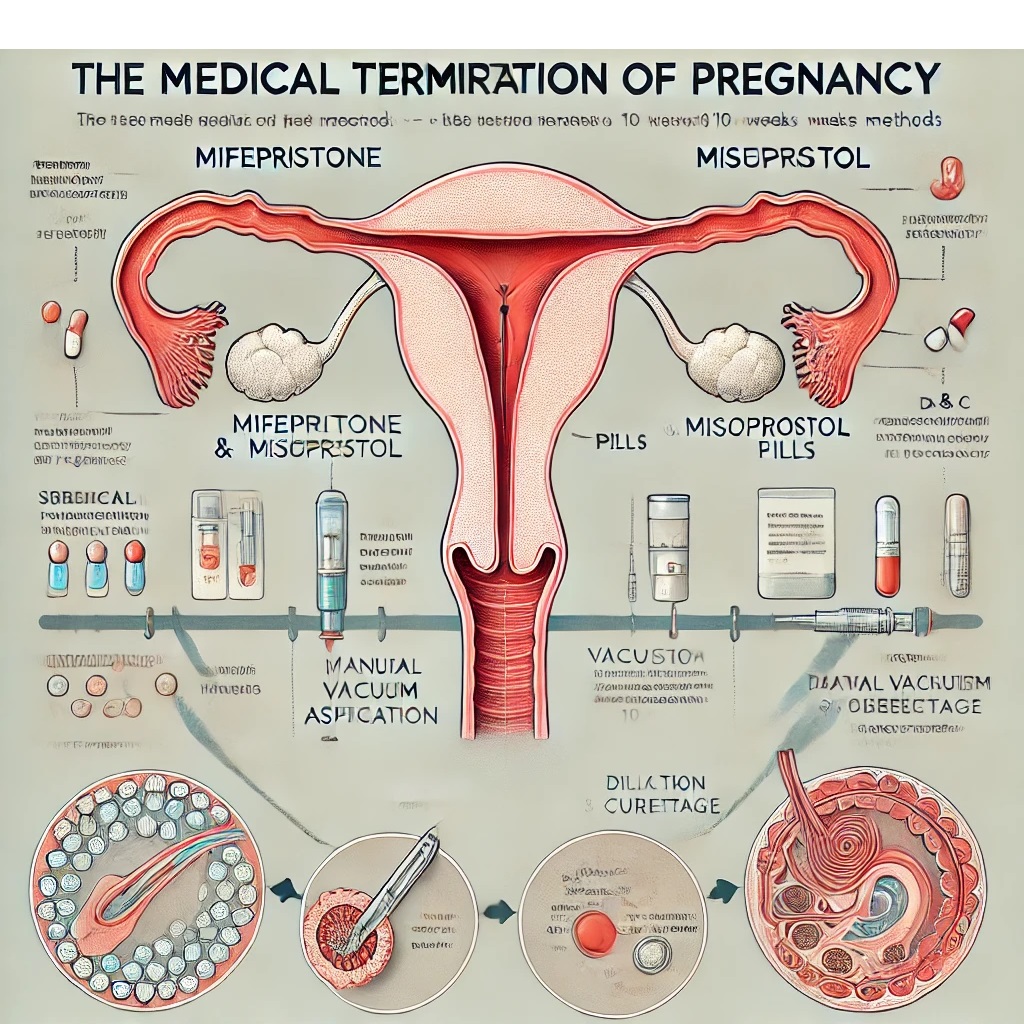
Medical Termination of Pregnancy (MTP) and Reproductive Health
Introduction
Medical Termination of Pregnancy (MTP), commonly referred to as abortion, is a medical procedure used to terminate a pregnancy. It can be performed through medication or surgical methods and is generally considered when continuing the pregnancy poses risks to the woman’s health or in cases of fetal abnormalities, unwanted pregnancies, or pregnancies resulting from rape. MTP is a crucial aspect of reproductive health, empowering women to make informed choices regarding their reproductive rights and well-being.
1. Understanding Medical Termination of Pregnancy (MTP)
Medical Termination of Pregnancy is the process of ending a pregnancy before the fetus is viable outside the womb. It is typically carried out within the first 20 weeks of pregnancy, although some countries may have different legal timeframes. MTP is performed for various reasons, including:
- Health Risks to the Mother: When continuing the pregnancy endangers the life or physical health of the mother.
- Severe Fetal Abnormalities: When there are significant congenital or genetic abnormalities detected in the fetus.
- Unwanted Pregnancies: In cases where the pregnancy is unplanned or undesired, including those resulting from contraceptive failure.
- Pregnancy Due to Sexual Assault or Rape: MTP may be considered to address the psychological and social challenges associated with pregnancies from rape.
2. Methods of Medical Termination of Pregnancy
There are two primary methods used to perform MTP: medication-based (medical) and surgical methods. The choice of method depends on the gestational age of the pregnancy and the health condition of the woman.
a. Medical Methods
Medical abortion involves the use of medications to induce the termination of pregnancy. It is typically used during the early stages of pregnancy (up to 10 weeks). The most commonly used medications are:
- Mifepristone: This drug blocks the hormone progesterone, which is necessary for pregnancy continuation. It detaches the embryo from the uterine wall.
- Misoprostol: Taken after mifepristone, misoprostol induces uterine contractions, helping expel the pregnancy tissue.
The combination of these drugs is highly effective in terminating early pregnancies and can be taken orally or vaginally under medical supervision.
b. Surgical Methods
Surgical abortion is used when medical abortion is not suitable or when the pregnancy is beyond the early weeks. The main surgical procedures are:
- Manual Vacuum Aspiration (MVA): Used for pregnancies up to 12 weeks, MVA involves using a suction device to remove the pregnancy tissue from the uterus.
- Dilation and Curettage (D&C): This procedure involves dilating the cervix and using a surgical instrument to scrape the uterine lining and remove the pregnancy tissue.
- Dilation and Evacuation (D&E): Commonly used in the second trimester, D&E involves dilating the cervix and using a combination of suction and surgical tools to evacuate the contents of the uterus.
3. Legal and Ethical Considerations
The legality of MTP varies across countries. In some nations, abortion is legally available on request, while in others, it is restricted or permitted only under certain circumstances, such as to save the woman’s life or in cases of rape. Ethical considerations around abortion involve the rights of the mother, fetal viability, and cultural or religious beliefs.
In India, the Medical Termination of Pregnancy Act, 1971, allows abortion up to 20 weeks under certain conditions, such as risk to the mother’s life, fetal abnormalities, or contraceptive failure in married women. In 2021, the act was amended to increase the upper gestational limit for certain cases to 24 weeks and allow unmarried women access to abortion services in cases of contraceptive failure.
4. Impact of MTP on Reproductive Health
Medical Termination of Pregnancy is a vital aspect of reproductive health as it provides women with the autonomy to make decisions regarding their bodies and pregnancies. Some key aspects include:
a. Reducing Maternal Mortality and Morbidity
Unsafe abortions are a significant cause of maternal mortality worldwide. Access to safe and legal MTP services reduces the risk of complications from unsafe procedures, thereby lowering maternal mortality and morbidity rates.
b. Psychological and Social Well-being
Unwanted pregnancies can have profound psychological effects, including stress, anxiety, and depression. MTP allows women to avoid unwanted pregnancies and better manage their reproductive health, leading to improved mental well-being.
c. Empowering Women
MTP is a crucial part of reproductive rights, empowering women to make informed choices about their health, career, and family planning. It helps them avoid unintended childbearing and allows for better economic and social participation.
5. Risks and Complications of Medical Termination of Pregnancy
While MTP is generally safe when performed by qualified healthcare professionals, it does come with potential risks, such as:
- Infection: There is a risk of uterine or pelvic infection, particularly with surgical abortion.
- Heavy Bleeding: Some women may experience significant bleeding after the procedure, necessitating medical intervention.
- Incomplete Abortion: In some cases, the pregnancy tissue may not be completely expelled, requiring additional medical or surgical treatment.
- Emotional Effects: Some women may experience emotional distress or regret after an abortion, although these effects vary.
6. Counseling and Post-Abortion Care
Post-abortion counseling is essential for addressing the physical and emotional needs of the woman. Counseling can help manage potential psychological effects and provide guidance on contraception to prevent future unintended pregnancies.
Post-abortion care may include:
- Monitoring for Complications: Ensuring there are no signs of infection, excessive bleeding, or incomplete abortion.
- Contraceptive Counseling: Advising on suitable birth control methods to avoid future unintended pregnancies.
- Emotional Support: Providing psychological support or referrals to counseling services, especially for women who may experience emotional distress.
7. Case Study Example
A 25-year-old woman, married and using contraception, discovers she is 8 weeks pregnant despite contraceptive use. She and her husband decide not to continue with the pregnancy due to their current financial situation and personal circumstances. After discussing options with a healthcare professional, they choose a medical abortion using mifepristone and misoprostol under medical supervision.
The woman experiences mild cramping and bleeding but recovers without complications. Post-abortion counseling helps her choose a different contraceptive method, addressing the previous method’s failure. The woman feels empowered by her ability to make an informed choice about her reproductive health.
See in Fig:

The illustration above depicts the process of Medical Termination of Pregnancy (MTP), showing both the medical and surgical methods. The left side demonstrates the use of mifepristone and misoprostol pills for early-stage pregnancy termination, while the right side illustrates surgical options like manual vacuum aspiration (MVA) and dilation and curettage (D&C) for later stages.
10 Questions and Answers related to Medical Termination of Pregnancy (MTP) and Reproductive Health:
Question 1: What is Medical Termination of Pregnancy (MTP)?
Answer: Medical Termination of Pregnancy (MTP), commonly known as abortion, is the medical process of ending a pregnancy before the fetus is capable of surviving outside the uterus. It can be performed using medications or surgical methods and is typically considered for health reasons, fetal abnormalities, or unwanted pregnancies.
Question 2: What are the common methods used for MTP?
Answer: The two main methods for MTP are medical methods (using drugs like mifepristone and misoprostol) for early pregnancies, and surgical methods (such as manual vacuum aspiration (MVA) and dilation and curettage (D&C)) for later stages of pregnancy.
Question 3: Up to how many weeks is MTP typically allowed in many countries?
Answer: MTP is usually allowed up to 20 weeks of pregnancy in many countries, with some exceptions permitting up to 24 weeks or beyond in cases involving significant health risks to the mother or severe fetal abnormalities.
Question 4: What are some reasons for opting for MTP?
Answer: Reasons for opting for MTP include risks to the mother’s physical or mental health, fetal abnormalities, pregnancies resulting from rape or incest, and unwanted pregnancies due to contraceptive failure.
Question 5: How does medical abortion with mifepristone and misoprostol work?
Answer: In medical abortion, mifepristone is first taken to block the hormone progesterone, detaching the embryo from the uterine wall. Misoprostol is then taken to induce uterine contractions, helping expel the pregnancy tissue.
Question 6: What are some potential risks associated with MTP?
Answer: Risks associated with MTP can include heavy bleeding, infection, incomplete abortion (where not all pregnancy tissue is expelled), and emotional distress, although these risks are relatively low when the procedure is conducted under proper medical supervision.
Question 7: How does access to safe MTP services impact maternal health?
Answer: Access to safe MTP services reduces maternal mortality and morbidity by preventing complications from unsafe abortions. It also provides women with safe options for managing unintended pregnancies.
Question 8: Why is post-abortion care important?
Answer: Post-abortion care is important for monitoring any complications, providing psychological support, and offering contraceptive counseling to prevent future unintended pregnancies. It ensures the woman’s physical and emotional recovery.
Question 9: What legal considerations exist around MTP?
Answer: Legal considerations vary by country, with some allowing MTP on request up to a certain gestational age, while others impose restrictions based on health risks, fetal conditions, or instances of rape. Laws aim to balance the rights of the woman with ethical considerations around fetal viability.
Question 10: How does MTP relate to women’s reproductive rights?
Answer: MTP is a key aspect of women’s reproductive rights, as it enables women to make informed decisions about their pregnancies. It empowers them to manage their health, family planning, and life circumstances, contributing to gender equality and better health outcomes.






